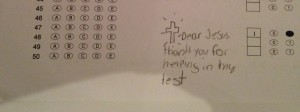Technically, we don’t let our students quit until high school, but I know from experience that some middle-school students quit long before high school – even if their bodies are still occupying school desks. If I am lucky, I can adapt my grading, and I have done so when allowed, so that hard effort results in decent grades. I’m only one teacher, though, and I only have so much control over grading. Unfortunately for the student below, Jesus has no control, or at least is staying out of the fray..
| During two years, I worked at schools that introduced “differentiated grading,.1 virtually eliminating homework and behavior from the grading system. Grades were based on tests, projects and quizzes and no zeroes were allowed. If a project was not turned in, that project became a “50%” in the gradebook. If a student received 30% on a test, that test became 50%. | ||
 |
||
| In my time teaching, I have seen grading systems come and go regularly. Regardless, when the content I am forced to teach falls too far outside my students understanding and level of academic mastery, differentiated grading and other grading systems function poorly.
The ultimate absurdity of my last teaching year came when the special education teacher and I (bilingual) were forced to invent extra tests and quizzes to get our students above passing. Required tests and quizzes were already sucking up around one-fifth of the school year. But we had to create more assignments in the testing category. What happens when an inflexible set of tests and quizzes based on 7th grade Common Core Standards attack a classroom of students whose document MAP® levels of mathematical mastery put them at an average 3rd grade level? What happens in a system where administration requires the school’s grading program to base final grades 100% on tests, quizzes and projects? When daily work cannot be factored in? When behavior becomes an irrelevancy in the grading process? If you want kids to pass, you have to make sure you create extra tests and quizzes that they are actually able to pass. At a lunch with a former colleague, we were describing our extra tests and quizzes and we were all laughing. The idea was so absurd. I can’t imagine what the kids thought. I explained why we needed the extra tests and quizzes, and they understood. But if I’d been a kid in that class, I’d have felt like I’d fallen down the rabbit hole in Alice in Wonderland. I’d have been waiting for the Queen of Hearts to pop in and shout, “Off with their heads!” I’d have suspected my teacher of eating the mushrooms. At least, they did not blame me, not after the first month anyway. They knew I was trying to keep everyone in the game as best I could. They helped when they could. I had volunteer peer tutors, just not enough tutors who actually knew the week’s math. Could we please hand education back to the classroom teacher? Top-down management is not working. Too much of what is coming down from our system of top-down management seems to be “uncommon nonsense,” to quote Alice. |
[1] A term particularly associated with Rick Wormeli, as well-known educator/researcher. While I dislike putting the grade floor up near 50% due to its potential to create last-minute schlock efforts, many of Rick Wormeli’s arguments about mastery-based grading positively ooze common sense, at least if we want to graduate students who understand class content. The 50% floor proceeds from the idea that “0” grades distort the grading scale. Assignments that are not turned in become fails at 50%, rather than 0%, thus impacting averages less. This allows students to get back into the game when they are failing since students can turn in assignments and redo work that gets them back above passing rather easily. I suggest looking up Wormeli’s thoughts on grading.

